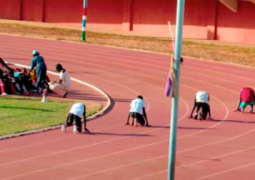
Without
risking an over-kill of this point, here are some more examples that will drive
home the point I am trying to put over. When you try to chase out a frog from
her comfort zone at the cool and moist foot of a tree; what is the frog’s
reaction? Will it not fill her abdomen with air to scare you? When you come
near a hen with her chicks? When you come near a dog and her puppies?
When
people are scared, you can see them jump over walls as high as ten feet,
something we cannot do ordinarily. Maybe you can ask those that fled, what was
going through their minds and how they felt and why they left? For those that
decided to ride out the storm, if it came, what was going through their minds?
Perhaps ask Mr Jamme what happened to him when the jet fighter wooshed past
state house? Did his stomach rumble or did he experience some inner tensions
making him want to release something in him? How did he feel when he peered
through his pair of binoculus and saw the war ship inching close and docking
out-stream?
Fear
is a phenomenon that is difficult to master. It may even paralyse and
emasculate us. It may transform and turn us into shadows of our real selves. It
can make us lie needlessly. And turn us into a band of grovellers and children
who cannot make their own decisions but depend on an overlord to do so for
them.
Do
we; some of us… tell lies when we are afraid... Afraid of what we don’t know,
afraid of what others will think, afraid of what will be found out about us?
Have
you noticed that every time we tell a lie, the thing we fear grows stronger?
I
will tell you what Jamme knew and how he played with our fears and anxieties?
The same fears he himself harboured and tried to manage when he knew that a
case had already been filed against him at The Hague. He saw his friend Gbagbo,
Charles Taylor, Foday Sankor, Strasser… all of them go, and the list is long!
Jamme
then held out the fears below as a Damocles over our heads:
Fear
of the midnight knock
Fear
of his own Revolving dock
We
fear the unknown, what obtains behind those tall grey walls; torture and the
rumors of torture.
The
fear of losing one’s job
The
fear of being put to shame
The
fear of imprisonment
The
fear of what the neighbors will say?
The
fear of poverty, destitution and their consequences
Are
there any more?
These
fears among several others gave Jamme the leverage he had utilized skillfully
to instill fear in us, between and among us, even with our neighbors in
Senegaal and the international community. ‘Gambia will never be recolonized as
long as I am alive’; he will say to invoke local nationalist sentiments. For a
long time, Gambians bought into his antics and it did play out well on our
sub-conscious minds to the extent that we even feared each other, our
neighbors, our friends etc. We became a people that looked over our shoulders;
looked around before uttering the name of Lord Voldemort, a population of
whisperers, gossipers, a divided society and the division of that society was
based on those that knew his treachery
but still held the Hare and chased with the hounds. There were of course those who saw through
him and disapproved. The latter he called the ‘cockroaches’ of the Diasporas.
Interestingly
enough, Jamme himself feared us so much
that he evolved methods of social control rooted in fear to contain us and his
own fears. Could it be that Mr. Jamme even waved the gratuity entitlements of
his members of Parliament as a carrot for them to extend his illegal bid to
stay in power? On a final note on fear,
we all experience fear to a greater or lesser extent and in different contexts.
This is what dictators know and utilize to their best advantage.
Ultimately,
we, you and I, all of us developed what I call a mass psychoses of siege with
its blend of associative mentalities such as connmanship, one upmanship,
fang-kung fang-kung, boppa -sa boppa pardon the phrase… arse covering and pretence.
I
will now try to draw some lessons from the past fifty two years and what to
watch out for.
I
have the modesty to admit that I might have missed out on some very important
lessons. The list is in exhaustive and by the way, you can add, take away or
suggest something that are even better than I have hitherto proposed in the
tentative list below:
That politics is not about ethnicity.
Yes we may come from different ethnic groups but to use this as a trump card to
rule over others because you are the majority ethnic group takes us back to the
dark ages. You see why Jamme and many other leaders in Africa imbued with this
backward thinking failed dysmally.
I
am going to knock this point firmly on its head as it is a very dangerous
phenomenon that threatens the coalition and the way forward for The Gambia,
post Jamme.
In
the past, colonisers whipped up ethnic differences in order to divert attention
from the colonial situation at their door-steps. Is it not intriguing
therefore, that those so-called enlightened politicians, who can see the wood
for the trees and evil from immorality of the danger of using ethnic and
religious politics as a means of
feathering their nests.
The
problem since independence is that the African elites that assumed the helms of
state, had difficulty in seeing beyond colonialism, the Empire, their greed and
self-aggrandisement. The withdrawal of colony and Empire had meant that the
elite were left in a void and were deprive of any meaning and purpose. Without
the Empire, ethnic and religious nationalism are the most attractive, viable
and vibrantly vitalising forces for them, as they fit nicely into their brand
of opportunistic politics in which, any
intrigue, alliance or betrayal is justifiable. The coalition must therefore guard
against this menace/pitfall/tenency!
No matter how long a people are held
in captivity or against their will, they will rise up and free themselves. They
do not need to use the same methods as was done in elsewhere. They will always
find country-specific solutions to their country-specific problems.
Both the Jamme and Jawara regimes
disemphranchised and alienated their country men and women in the diaspora when
they should have been accorded them the status of non-negligible partners to
the development of their country.
The
Gambian diaspora has kept the country afloat through a turbulent period
especially during the past decade and half through remittances,
investments and revenues they have
generated. They will continue to be an important resource and development
partner for The Gambia.
Dictatorships of all forms, must be
denounced and opposed. This includes the denunciation of all spiritual leaders
and turncoat opportunistic elders who
only represented themselves and no one else. Instead of denouncing and opposing
terror, they kept on singing the praises of and praying for the perpetrators of
terror to rule and reign over us and implore God to save them. Intrestingly,
those that profitted from Jamme’s rule by being given favours saw what happened
when he was on the verge of losing his grip on power. Jamme withdrew the
previleges he granted them and even humiliated them.
Isn’t there somewhere in both the
Quran and Hadith where it is said that if a malaise is prevalent in society, as
a muslim, it is incumbent upon you to remove it? If you cannot remove it, speak
openly against it? If you fail, keep it in your heart for future deliberation?
My haunch is that the religious/spiritual elders did not speak or try to remove
the blatant misrule and excessess of Jamme and had turned a blind eye to his
misdeeds because it was convenient for them.
They had a stake in the Jamme regime because he bribed them with either
money or with vehicles perhaps a trip to the Hajj? I had indicated earlier that
in his psychological make-up, there is no such thing as charity in him. Giving
was always tied to a returned favour. He will not send you to Hajj if he does
not expect a return favour from you. This is where he had cornered many people
in the same way that he had cornered the recipients of material gifts from him.
Isn’t
there something in the Quran and Hadith about Hajj where Muslims are forbidden
from going to Hajj with funds that come from dubious sources? Do we all not
know how much Jamme earned every year and juxtaposing that against the colossal
funds that went towards the number of pilgrims he sends every year and do the
figures add up? Aren’t there the Hajj Emirs who can warn us about the
infractions of the rules of Hajj and the consequences of that?
It
is sad that they that have monopoly over the interpretation of the scriptures
and spirituality had to stoop so low; so low, lower than a snakes belly. Some
of them had conveiently misinterpreted verses and sections of the quran and
hadith completely out of context to justify the Jamme tyranny. I have heard
them say time and again that leaders were placed in their positions by Allah
and Allah will remove them when he wills. If this is the case, then we will all
pack our bags and go to sleep. I hope that the same Imams can refer back to the
confrontations between the prophet Musaa and Pharoah; the rule of Umar Ben
Abdul Aziz ... And let us know whether he and the other rulers of Makka sat on
their hands and did nothing in order to buy back the freedom of slaves, free
the poor from the fetters of necessity, eliminate poverty in Mecca and still maintained a balanced budget at the
Baity Maal?
God has instructed us that our mission
on earth is to worship him and him alone. Live a clean and righteous life and
earn your keep by the sweat of your brow. They should perhaps remind us and
themselves that faith, planning and labour are all interlinked and
interdependent variables. Our faith should ginger us up into planning our
lives; how we are going to put bread on the table by pulling ourselves up by our
own boot-straps and not depend on others for handouts, charity and the goodwill
of politicians and connmen . This way, we are not so susceptible to
manipulation, abuse and compromising our Diin by tinkering, meddling and
doubling into politics.
Many Gambians had all learnt that in
unity lies strength! If the opposition and the diaspora Gambians did not unite,
there was no way they could unseat and show Jamme the door. I am still in doubt
whether the coalition government has learnt that the principal contradiction
was Jamme and not how many fulas, wolofs,
akus or mandinkas were in their parties. People from all ethnic grpuos
came together, railled around the oipposition and over threw the monster.
I trust that the coalition government
will have also learnt that the politics of patronage and the old-boy network
should be consigned to the tombstones of yesteryears.
The future of Gambian politics lies
in the youth and not of re-cycling spent forces.
A coalition government is a government
that puts together all the stake-holders in the society.
The allocation of Ministerial
portfolios is not tantamount to a horse-trading excersie. It is about finding
the right people for the right job which in management parlance means matching
like with like. Each according to his ability and each job to be matched with
the abilities and aptitudes to do them.
No more square pegs in round holes all over again. ‘Who give dog horn?’
say my Jamaican brethren. Do not give
whiskers to hens. They will not know what to do with them.
This is the chance for the coalition
government to put the right button in the right button hole, once and for all!
At
the last count, there were thousands of
Gambian professionals-mostly University professors, researchers and technocrats
all over the world. The coalition can engage with and harness both their
material and human resources for the country’s benefits. A way must be found to
initiate a dialogue with them. By the way, even locally, there are some very
able people who can input in the new Gambia project in significant ways. In fact, if I had my
way, no coalition leader would be in the government.
That
in any coalition government, pragmatism is a cardinal principle in the
management of the partners of the coalition. We must learn to give and take
with the best of intensions, do what you
must for the right reasons and live with your differences-this is the stuff of
life! This is not to say that principled
politics should be compromised but one must quickly accept that there will
inevitably be divergent views owing to perhaps deep ideological differences
but, it is how one manages these dissenting views/stances for the interest of
the common good of all.
I
also do not believe that it is realistic to think that twenty two years worth
of damage can be repaired in three years. I will suggest a few things for the
new government and they are as follows:
Stay together and put up candidates
for the up-coming elections in April and the following term. Fifty two years of
damage cannot be repaired in just three years. You will win with an even
greater margin( pardon the ponditry).
Institute some electoral reforms for
the purposes of bringing in and giving voice to the voiceless and power to the
powerless that is to say, those that need to have it ie, the average, run off
the mill Gambian.
Immediately, engage in massive civic
education programmes through all available media. Back this up with actions so
that the average person can relate ideas with tangible actions.
Establish a joint think tank between ministries and independent trustees
and call members of the diaspora and civil society to join in and be a part of
the change and have ownership to the new project, the new Gambia project
Repair the damage done to relations
with foreign governments, bi and multi-lateral institutions around the
world.
The observance of human and peoples
rights, the rights to worship, the freedom of the press continue to be a core principle of governance
in The Gambia.
Establish an outfit, something like an upper chamber to include the leaders
of the coalition, academics, leaders of industry, commerce, retired but active and knowledgeable persons
with experience, jurists, etc. as a means of regulating the excessess and the
provision of sound advice to the
government especially in relation to fiscal and policy matters.
Aim to build capacities of
individuals, among individuals in all the sectors especially the public sector
institutions.
This is a sore point I know but we
must address it. Instill dicipline, change attitudes, instill some work ethic
all across the board especially among the uniformed officers, civil servants.
We have a serious problem there!
Review the salaries. This will be
based on a constant market-basket surveys so that the worker can have a living
wage and will not be tempted to do otherwise.
Review the entire educational
curricula from early childhood to University levels and provide them with the
scope of addressing the economic and
other sectors of the economy.
Institute procedings for the control
of waste, mismanagement and fraud.
A thorough review of all the sectors
of the economy is needed and all of them
must generate a ten-year policy and plan of action with a budget.
Institute policies and plans in
relation to education, agriculture, fisheries, tourism, energy, infrastructure
health care, youth, sports and culture, all of which must demonstrate sound judgment and, pragmatism
and must speak to the realities of the local terrain.
As much as possible, work with the
ECOWAS and the regional groupings in the African Union. Try to harmonise our
economies especially our energy policies. We cannot hope to industrialise
without a coherrent, realistic and
tangible policy in our energy sectors so that African unity and African
independence do not remain the empty slogans they have been for the past sixty
years. ECOWAS’ action in The Gambia is a good and laudable start so, keep the momentum.
For Mr Jamme and his cyphers, the
message is clear. Tyranny is a very high place from which there is no easy
descends. Is there a role anymore for the APRC now or will it go the way of its
leader?
For the coalition, you have a behemoth
to conquer. Only your commitment, dedication, selflessness and devotion will
help you to conquer the challenges ahead in spite of its enormity. Remember!
You are starting from year zero!
All
the best to you and The Gambia and Gambians!




